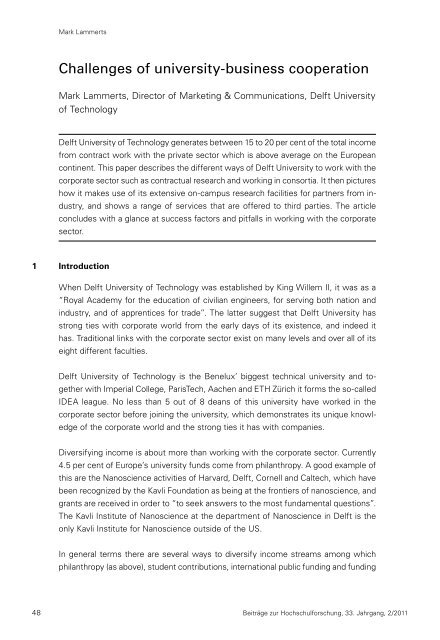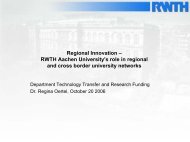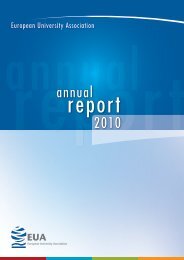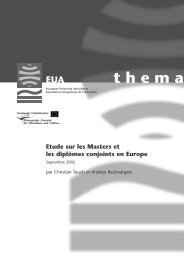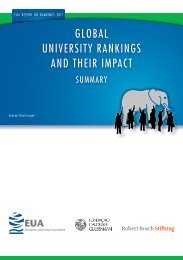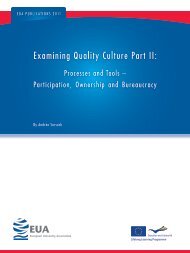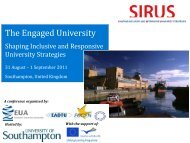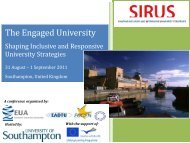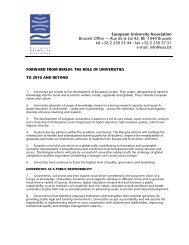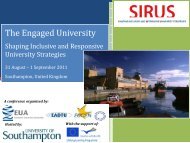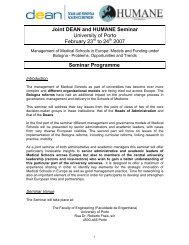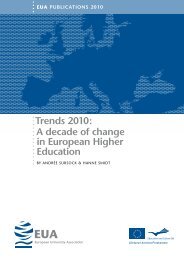Beiträge zur Hochschulforschung - European University Association
Beiträge zur Hochschulforschung - European University Association
Beiträge zur Hochschulforschung - European University Association
You also want an ePaper? Increase the reach of your titles
YUMPU automatically turns print PDFs into web optimized ePapers that Google loves.
48<br />
Mark Lammerts<br />
Challenges of university-business cooperation<br />
Mark Lammerts, Director of Marketing & Communications, Delft <strong>University</strong><br />
of Technology<br />
Delft <strong>University</strong> of Technology generates between 15 to 20 per cent of the total income<br />
from contract work with the private sector which is above average on the <strong>European</strong><br />
continent. This paper describes the different ways of Delft <strong>University</strong> to work with the<br />
corporate sector such as contractual research and working in consortia. It then pictures<br />
how it makes use of its extensive on-campus research facilities for partners from in-<br />
dustry, and shows a range of services that are offered to third parties. The article<br />
concludes with a glance at success factors and pitfalls in working with the corporate<br />
sector.<br />
1 Introduction<br />
When Delft <strong>University</strong> of Technology was established by King Willem II, it was as a<br />
“Royal Academy for the education of civilian engineers, for serving both nation and<br />
industry, and of apprentices for trade”. The latter suggest that Delft <strong>University</strong> has<br />
strong ties with corporate world from the early days of its existence, and indeed it<br />
has. Traditional links with the corporate sector exist on many levels and over all of its<br />
eight different faculties.<br />
Delft <strong>University</strong> of Technology is the Benelux’ biggest technical university and to-<br />
gether with Imperial College, ParisTech, Aachen and ETH Zürich it forms the so-called<br />
IDEA league. No less than 5 out of 8 deans of this university have worked in the<br />
corporate sector before joining the university, which demonstrates its unique knowl-<br />
edge of the corporate world and the strong ties it has with companies.<br />
Diversifying income is about more than working with the corporate sector. Currently<br />
4.5 per cent of Europe’s university funds come from philanthropy. A good example of<br />
this are the Nanoscience activities of Harvard, Delft, Cornell and Caltech, which have<br />
been recognized by the Kavli Foundation as being at the frontiers of nanoscience, and<br />
grants are received in order to “to seek answers to the most fundamental questions”.<br />
The Kavli Institute of Nanoscience at the department of Nanoscience in Delft is the<br />
only Kavli Institute for Nanoscience outside of the US.<br />
In general terms there are several ways to diversify income streams among which<br />
philanthropy (as above), student contributions, international public funding and funding<br />
<strong>Beiträge</strong> <strong>zur</strong> <strong>Hochschulforschung</strong>, 33. Jahrgang, 2/2011


